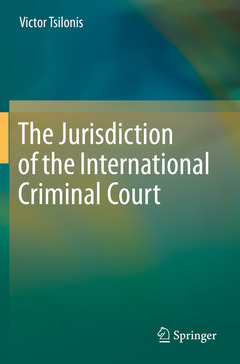Description
The Jurisdiction of the International Criminal Court, 2019
Author: Tsilonis Victor
Language: English
Subjects for The Jurisdiction of the International Criminal Court:
283 p. · 15.5x23.5 cm · Paperback
Description
/li>Contents
/li>Comment
/li>
The book provides a holistic examination of the jurisdiction of the International Criminal Court (ICC). The main focus is placed on the three pillars which form the ICC?s foundation pursuant to the Rome Statute:
- the preconditions to the exercise of its jurisdiction (Article 12 Rome Statute)
- the substantive competence, i.e. the core crimes (Article 5-8bis Rome Statute, i.e. genocide, crimes against humanity, war crimes, crime of aggression)
- the principle of complementarity (Article 17§1 (a) Rome Statute)
The latter governs the ICC's ?ultimate jurisdiction?, since it is not merely sufficient for a crime to be within the Court's jurisdiction (according to the substantive, geographical, personal and temporal jurisdictional criteria), but the State Party must also be unwilling or unable genuinely to carry out the investigation or prosecution.
Finally yet importantly, the main ?negative preconditions? for the Court?s jurisdiction, i.e. immunities (Article 27 Rome Statute) and exceptions via Security Council referrals are thoroughly examined.The book is an excellent resource for scholars as well as practitioners and notably contributes to the existing literature.
The Definition of International Crime.- The Preconditions for the International Criminal Court to Exercise its Jurisdiction.- The Crime of Genocide and the International Criminal Court’s Jurisdiction.- Crimes Against Humanity Under the ICC’s Jurisdiction.- The ICC’s Jurisdiction Over War Crimes.- The Crime of Aggression: The Birth of a Crime.- Immunities Under Art. 27 ICCRSt and the ICC’s Jurisdiction.- The ICC’s Jurisdiction Following a Security Council’s Referral of a Situation Concerning Citizens of States Non-Parties to the ICC:the Situation in Sudan and Libya (Art. 25 UN Charter & 13(b)ICCRSt).- The Awakening Hypothesis of the Complementarity Principle.
These books may interest you

The Complementarity Regime of the International Criminal CourtNational Implementation in Africa 137.14 €



